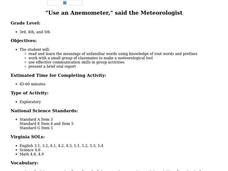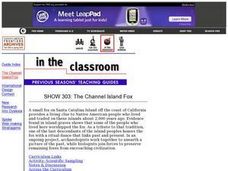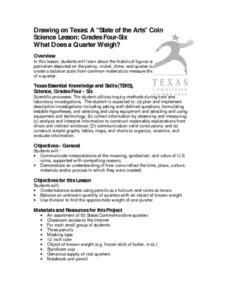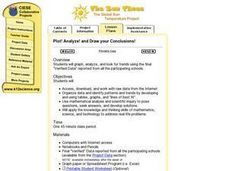Curated OER
Back Up
Third graders participate in a review game about significant people who have made inventions.
Curated OER
Ancient Animals
Students explore ancient rock art in Arkansas. Through discussion, research, and hands on activities, they identify the animals and stylized features of rock art found in Arkansas. Students identify the various habitats of he animals...
Curated OER
Who's the Baddest?
Students are introduced to the realm of social insects, their role in the environment and the biological features that make them unique.
Curated OER
Organization 1: Look at What I Organized!
Students recognize that organizing things can make it easier to find things later.
Curated OER
"Use an Anemometer," said the Meteorologist
Students participate in an hands-on construction of an instrument to measure wind speed.
Curated OER
Comparative Stream Quality
Learners examine water quality on a nearby stream. They collect water samples and test for various factors, including any contamination from the treatment plant, and present their information in a Powerpoint presentation.
Curated OER
Draw your Conclusions
Students analyze data from a student discussion website and write a report on the outcome of an investigation regarding their local water quality. As part of a larger unit students then post the summary of their investigation on the...
Curated OER
How Do We Learn About the Past?
Sixth graders discuss the role of an archaeologist as a class. After viewing photographs, they relate the objects found in their local area and Ancient Egypt. They draw a picture of an object that represents their own culture and gives...
Curated OER
"Use an Anemometer," said the Meteorologist
Pupils work in groups to make an instrument the Meteorologists use to measure the speed of the wind after the teacher reads them a poem about the wind. Students then review vocabulary that they studied from their lesson.
Curated OER
Writing a Short Story - Weather
Learners use the information they wrote about on the topic they chose in studying About Weather. They then write a short story using the information choosing a theme, setting, characters, and the plot.
Curated OER
Learning About Weather
Students decide what type of weather they would like to write about such as tornadoes, hurricanes, snow, hail, floods, or another type of weather.
Then, they look up the information and jot down notes about that particular subject....
Curated OER
SHOW 303: The Channel Island Fox
Students explore how archaeologists and other scientists use different clues to piece together a picture of the past. Students perform activities that allow them to conduct three types of scientific research. They discuss their...
Curated OER
What Does a Quarter Weigh?
Learners study the historical figures and symbols of U.S.
patriotism depicted on the penny, nickel, dime, and quarter coins. They
create a balance scale from common materials to measure the approximate weight
of a quarter.
Curated OER
Word Adaptation
Seventh graders differentiate evolution and adaptation. In this biology lesson, 7th graders make new words from a given word by adding or changing a letter. They set up a T-chart and enumerate how adaptation is like or unlike evolution.
Curated OER
One, Two, Three. TMV
Students, in groups, design their own experiments to determine how the mode of application of the virus extract affects the various plants that students have grown from seed.
Curated OER
Consider the Issues
Students develop and express opinions on personal and societal issues in biology through journal entries (written and other forms), oral position statements and group discussions.
Curated OER
HyperStudio Animal Project
Fourth graders create a HyperStudio project on an animal of their choice. They discuss the animal's habitat and adaptations. They also identify any interesting facts about their animal.
Curated OER
From Seed to Plant
Students adopt seeds, recording their observations as they draw their seeds, germinate them, and plant their seedlings using the hydroponic method. Students maintain journals recording their germination experiments.
Curated OER
Plot! Analyze! Draw your Conclusions!
Students download data reported from the Global Sun Temperature Project website. They graph and analyze the data looking for trends and patterns. They prepare a class report with their observations and post it to the website.
Curated OER
Float My Boat
Fourth graders, in groups, experiment with density and the displacement of water by creating and designing their own boats and seeing which boat holds the most centimeter cubes without sinking..
Curated OER
Ecosystems
Sixth graders perform various labs, create presentations, and do hands on activities to explore the ecosystem.
Curated OER
Trees, Trees, Trees! - Adopt A Tree
Students adopt a tree, take a bark rubbing from that tree, and conduct research about that type of tree. They write an original piece about their tree using three facts and in a genre of their choice.
Curated OER
A Rainbow Under the Sea: How Do Animals Survive in the Ocean?
Second graders, with adult help, create a PowerPoint presentation on a selected ocean animal.
Curated OER
Aquifers
Learners participate in an experiment about aquifers. They answer questons and make observations about the experiment. They discuss how they can make a difference in the way water is used.

























